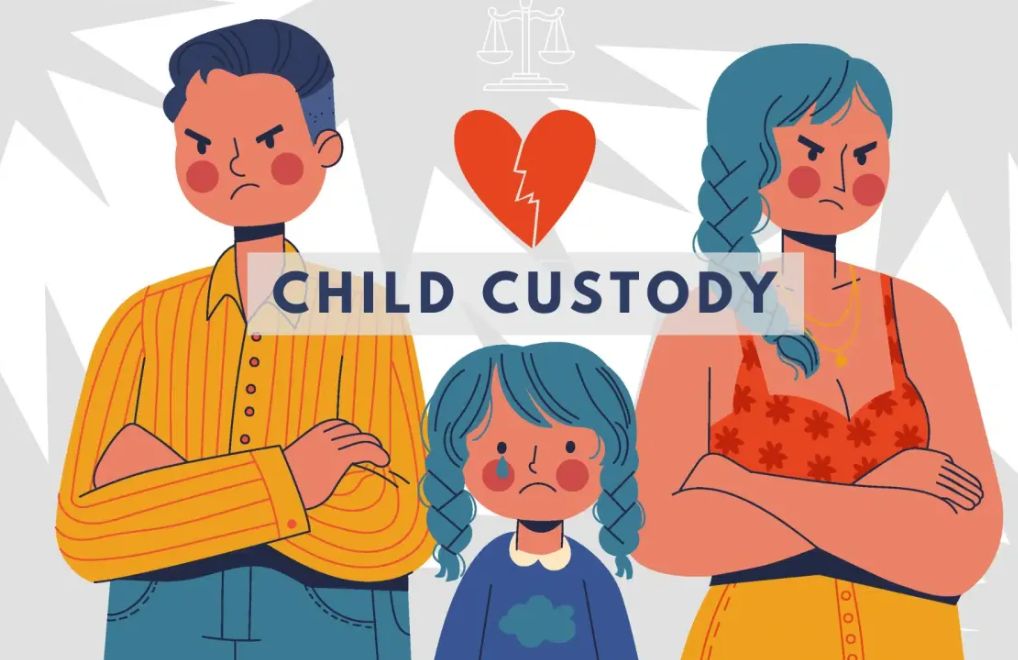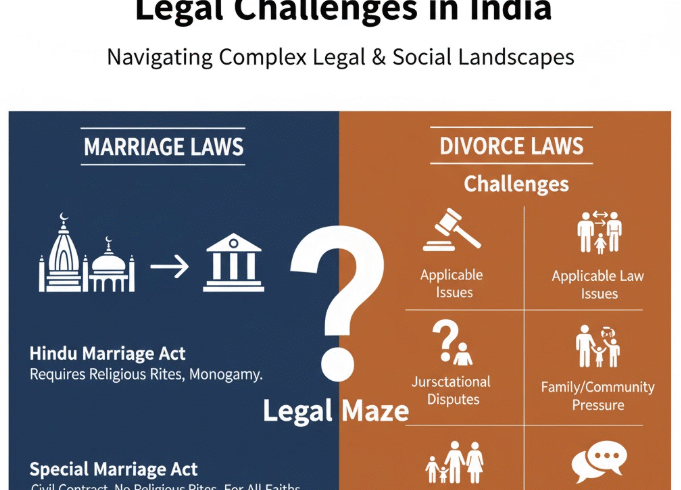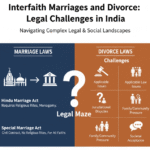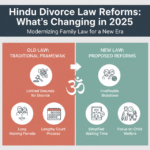Child Custody Disputes in Indian Divorce Proceedings: An Analysis
When parents who have lived together decide to separate, one of the most painful questions they face is: Who will take care of the children? In India, a divorce can be emotionally taxing for everyone involved & in case there are kids then it can be doubly painful. Thousands of Indian families do this dance each year, trying to figure out what’s best for their children and working through their hurt and anger.
This article covers it all—here’s everything you need to know about child custody in Indian divorce cases: from the types of custody that are available and how courts decide, to what kinds of rights parents have under different laws.
What Exactly Is Child Custody?
Child custody just means who gets to look after the child when parents split up or get a divorce. It covers decisions about the child’s residence, who can make important choices for how the child is educated and cared for, and how much time will be spent with each parent.
In India, custody is not as simple as one parent “winning” the child. Courts are always to consider “the best interests of the child, including but not limited to factors such as happiness, security and growth,” and pay close attention to a young person’s wishes about relationships with his birth parents. The child’s best interest, and not the wishes or rights of parents, is paramount.
Various Forms of Custody in India
Various types of custody can be awarded by Indian courts, according to each family’s circumstances. Here’s what they mean:
Physical Custody
This is where the child will effectively reside in the normal course of events. The parent who has a duty of care maintains the child’s residence, provides for the child’s daily needs and presides over their routine.
Legal Custody
Legal custody involves making the big decisions on behalf of that child. This involves selecting their school, choosing medical treatments, selecting their religion and deciding what they want to do in the future. There are occasions when both parents will have legal custody even if the child resides mainly with one parent.
Joint Custody
In shared custody, the child is cared for by both parents. This can mean:
- The child lives part of the time with each parent
- There is joint decision making by both parents
- The parents work together to remain part of the child’s life
Shared parenting is most effective when parents can communicate in a healthy manner and when they live near one another.
Sole Custody
Here, one parent has physical and legal custody. The other parent might receive visitation rights (time to see the child), but they don’t have decision-making power. Sole custody is awarded when one parent is unfit to make decisions for the child, or if parents cannot cooperate.
Third-Party Custody
More rarely, when neither parent is up to the task of supervision, grandparents or aunts and uncles might be awarded custody by courts. The safety and welfare of the child is paramount.
What Laws are Used in Custody Cases?
India’s population is so diverse that you have different personal laws for different communities. Here’s how it works:
Hindu Marriage Act, 1955
This law applies to Hindus, Buddhists, Jains and Sikhs. Section 26 provides that divorced parents shall have equal right to apply for custody of a minor child. The court cares only about the child.
Key points:
- Mother is generally the natural guardian of child below 5 years
- Beyond age 5, they consider a variety of factors
- Unless they’re too young (generally 9+ years old), the child’s preference does count
Guardians and Wards Act, 1890
This is natural law, which applies to all without distinction of religion. It is generally applied when personal laws don’t provide clear resolutions. The Act says that the child’s welfare is paramount – in other words, more important than anything else.
Muslim Personal Law
Muslim law (Sharia) prescribes separation of custody according to sex:
- Mothers are usually awarded daughters until 13
- Mothers are given son’s custody until 7 years
- After those ages, the father will more likely receive custody
But, in India, the courts now favor the welfare of children over rigid religious norms.
Christian Law and Divorce Act of 1869
Christian families’ custody decisions are made according to the Divorce Act. Courts can award custody to either parent, or share it between them, depending on what is in the child’s best interest.
Parsi Marriage and Divorce Act, 1936
This law is also practiced by Parsi families, and similarly takes into consideration what is in the best interests of the child for custody issues.
Special Marriage Act, 1954
Couples who married under this secular law (regardless of their religion) follow its custody provisions, which are determined solely on the basis of the child’s best interests.
For expert legal guidance on family law matters, visit Zista Legalis
Who Gets Custody, and How?
Indian judges do not flip a coin, or automatically side with the mother or the father. They carefully examine many factors:
Age and Gender of the Child
For babies and toddlers, the younger they are, the more likely it is that mom will be given custody. But this is not a strict rule. As children age, other factors come into play more strongly in courts.
Parent’s Financial Stability
Courts look at whether the parent can provide food, clothing, shelter, education and medical care. But privilege doesn’t guarantee victory in a custody fight. A poor parent who loves well is usually better than a rich parent who does not do so.
Child’s Own Wishes
If a child is old enough (generally between 9 and 12), judges can take that preference into account. When older, the child’s opinion means more. Courts interview the child in private to determine what the child actually wants, free from parental influence.
Parent’s Character and Conduct
Judges consider the behavior, lifestyle and moral character of each parent:
- Exposure to violence or history of abuse (physical, emotional or sexual)
- Substance abuse problems (alcohol, drugs)
- Mental health issues
- Criminal record
- Capacity to offer stable and loving home background
Relationship with the Child
Which parent did the child most interact with day to day? Who attends parent-teacher meetings? Who brings them to the doctor? The parent who has developed the deeper emotional bond is held in high esteem by the Courts.
Living Situation
Judges consider:
- Is the home safe for kids and a good environment?
- Will the child be forced to transfer schools?
- How close do the parents live to each other?
- Is the child able to continue making friends and follow a routine?
Willingness to Co-Parent
Courts look favorably upon parents who foster the child’s relationship with the other parent. A parent attempting to influence the child against the other parent (which is called “parental alienation”) may lose custody points.
The Welfare of the Child: The Golden Rule
The Hindu Minority and Guardianship Act under Section 13 specifically provides that “welfare of the child is of paramount consideration.” This means:
- The best interests of the child supersede parents’ interests
- Safety doesn’t take a back seat to religious or cultural beliefs
- Financial circumstances don’t solely dictate custody
- Courts may supersede personal laws for welfare of child
Recent court decisions underscore that “welfare” encompasses physical safety, emotional health, education, moral development and happiness.
Custody Rights at Different Ages
| Age Range | General Custody Arrangement | Factors to Consider |
|---|---|---|
| 0-5 years | Often with mother | High need for maternal care, breastfeeding |
| 5-9 years | Mother first choice, father has visiting rights | Child’s scheduling, school stability |
| 9-12 years | Child’s choice considered | Parental capability and child’s best interests |
| 12+ years | Child’s preference heavily favored | Older children’s maturity and understanding |
Note: These are general trends, not hard-and-fast rules. Every case is unique.
Rights of Visitation: The Best of Both Parents
Even if one parent is awarded custody, the other will typically be given visitation rights (sometimes referred to as “access rights”). This enables them to have quality time with the child.
Types of Visitation
Supervised Visitation: Occurs when there are safety concerns, and the visits take place with a third person (such as a social worker or family member) present.
Unsupervised Visitation: This means the parent may visit with his or her child alone at the home or other place.
Virtual Visitation: Video visits and phone calls, particularly when parents are at a distance.
Typical Visitation Schedule
Courts might order:
- Every other weekend with the parent not in custody
- One or two weeknights per week
- Half of school holiday periods and holidays
- Special occasions like birthdays
If parents do agree, they can negotiate their own schedule. Orders imposing schedules are made only when parents cannot cooperate.
Can Custody Orders Change?
Yes! Custody isn’t permanent. The court can be asked by either parent to modify custody if there is a substantial change in circumstances. Valid reasons include:
- The custodial parent becomes incapacitated (addiction, abuse)
- The child’s needs change (health problems, educational needs)
- The parent with custody insists on moving a great distance from the other
- The child says they want to change living arrangements
- The position of the non-custodial parent becomes drastically more favorable
Courts review modification requests carefully. They wouldn’t change custody simply because one parent remarried or earned more money. The alteration needs to be in the best interests of the child.
What About Fathers’ Rights?
Regarding mothers vs fathers – it’s a myth that courts in India are always biased towards mother. Young children are often kept with the mother, but fathers have just as much legal right to custody.
Recent trends show:
- Courts increasingly granting joint custody
- Dads gaining custody when they become the better nurturer
- Acknowledgment that fathers are important in the development of children
- Approach that recognizes the contribution both parents make
Fathers have to show—and not just talk about—their participation, stability and commitment to childcare, not just pay for it.
For more information on Indian family law, you can refer to resources from the Ministry of Law and Justice, Government of India.
The Legal Process: What to Expect
Step 1: Filing the Petition
The parent who wants custody files a motion in family court (if they are already divorced) or files the request for custody as part of their divorce case.
Step 2: Documentation
Both parents submit evidence:
- Income proof and financial documents
- Character certificates
- Medical reports
- School records
- Images and videos showing parent-child bonding
- Witness statements
Step 3: Mediation
Courts often require mediation first. A mediator trained in the process facilitates an agreement between parents without going before a judge. This spares them the time, cost and emotional agony.
Step 4: Court Hearings
If mediation does not work, both would present their arguments to the judge. Lawyers cross-examine witnesses, introduce evidence and advance the argument for why their client should have custody.
Step 5: Child Interview
Judges can also discuss the child’s (if old enough) emotions and desires when not under parental influence.
Step 6: Court Order
A custody order is then issued by the judge, specifying:
- Who gets physical custody
- Who gets legal custody
- Schedule of time to be spent with non-custodial parent
- Child support amount
- Any special conditions
Generally, the entire procedure lasts six months to two years according to complexity and court delay.
Child Support: The Financial Responsibility
Usually, the parent who does not have custody is required to pay child support in order to help cover the child’s costs. Courts calculate this based on:
- The paying parent’s income
- The child’s genuine needs (schooling, medical services, hobbies)
- The income and resources of the custodial parent
- Lifestyle standard of the child up to divorce
Child support runs until completion of age 18 or graduation from high school, whichever is later. Parents can agree on an amount or have the court decide.
Advice for Parents in Custody Disputes
Prioritize the child: Try to always put your child first—which means asking yourself, “Does this decision benefit my child?” not “Does this help me win?”
Document yourself: Be sure to document your involvement—school events you attended, medical appointments, time spent together.
Keep your cool and be respectful: Courts don’t look kindly on parents who badmouth their ex or demonstrate aggressive behavior.
Don’t use the child as a go-between: Expect that custody matters will be discussed between you and your ex-spouse.
Hire a professional: You may want to hire a seasoned family-law attorney and maybe even a child psychologist.
Be open: Hard-line parents who won’t bend can lose credibility with the judges.
Maintain stability: Keep the child in the same school, town and social group if at all possible.
Adhere to court orders: If you are not following visitation or custody orders, it will greatly hurt your case.
Recent Changes and Modern Trends
Indian courts are also rethinking their approach to custody:
- Gender-neutral approach: Getting beyond a default mom’s choice
- Joint child custody emerging: Acknowledging the value of both mom and dad
- Child’s voice is given more weight: Courts giving greater credence to older children’s choices
- Domestic violence getting attention: Tougher about awarding custody to abusers
- Mediation focus: Facilitating parents toward an amicable resolution
- Speedier processes: Some courts establishing fast-track family courts to shorten delays
Need professional legal assistance? Contact Zista Legalis for comprehensive family law services.
Frequently Asked Questions
Q1: Do mothers always get custody of children in India?
No. It means that, traditionally, mothers seeking custody tend to get young children, but fathers have an equal right. Best interests of the child, not the parent’s gender determine court cases.
Q2: How old does a child have to be to pick what parent they want to live with?
There is no set age but courts generally do weigh a child’s preference heavily when the child is at least 9 years old. If they show maturity, their selection holds a lot of weight at around 12-13 years old.
Q3: Are the grandparents able to get custody of their grandchildren?
If both parents are unfit or not available, then yes. Guardians and Wards Act, 1890 allows grandparents to file for custody. Courts have the authority to award custody, if in a child’s best interest.
Q4: What if one parent moves to a different city or another country?
The parent with primary custody generally must get court permission before relocating with the child. Courts weigh the parent’s interest to move against other parent’s visitation and child’s need for continuity.
Q5: Is it possible for a parent to lose custody permanently?
Custody orders can be modified if things change. A parent who has lost custody of a child may ask the court to give custody back if she addresses the original problems that brought about loss of custody.
Q6: What is the cost of a custody battle in India?
Costs can fluctuate widely depending on case complexity, lawyer costs and location. Simple cases may charge ₹25,000-50,000 and contesting the battles can go up to ₹2-5 lakhs. There is legal aid for people who cannot afford lawyers and public defenders stand ready to help at no cost.
Q7: What is temporary custody?
During the divorce process, courts have the ability to grant temporary custody of children until they come to a final resolution. This is to provide the child some sort of stability while the case goes on.
Q8: Is it possible to agree on custody without going to court?
Yes! Parents can decide on their own how they will split custody. They can formalize it through mediation or collaborative law. Courts will ratify reasonable agreements, providing the child is adequately protected.
Final Thoughts
It is never easy when there is a battle over child custody. They try parents as an emotional, financial and mental proposition. But a reminder: The objective is not to beat your ex-spouse. The idea is to make sure your child ends up happy, healthy and loved by both parents.
Indian Courts have traveled far to arrive at more equitable and child-centric decisions on the issue of custody. Whether you are Hindu, Muslim, Christian, Parsi or married under secular law is irrelevant—the child’s welfare is paramount.
If you’re in a custody battle, consult with a lawyer early and try to keep your child’s best interest top of mind as much as possible—which may mean asking yourself if you can settle things peaceably, without going to court. Your kids will someday thank you for taking the higher road, no matter how hard it may seem.
The end of a marriage is not the end of family, but rather looking for ways to be parents together.





